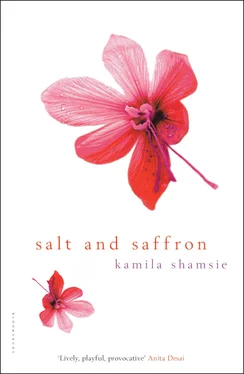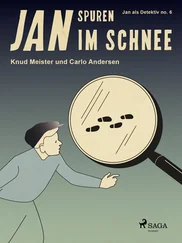He’d been unfailingly gracious right from the start, over four years ago, when Auntie Tano called him up to say that Aba and Mariam Apa were planning a trip to the town adjoining his lands to have a look at a mosque. ‘A mosque?’ Aba mouthed in horror as Auntie Tano chirped down the phone to Jahangir.
‘For architectural purposes,’ Auntie Tano added. ‘A client of Nasser’s wants the tiles of the outside wall replicated in his courtyard. So Nasser’s coming to have a look, and Mariam is going to sketch the tiles for the workmen in Karachi. They’re staying overnight. Do you know of any hotels …?’
‘Don’t be absurd,’ Jahangir said. ‘Tell them to stay with me. I’ll have my driver pick them up at the train station.’
It was that simple.
By the standard of the Ali Shahs, Jahangir was just a small landowner without the trappings of feudal power, but Aba was struck from the first by the deference of his servants. ‘It made me think that Masood must be a misfit here,’ Aba told me afterwards. ‘Oh, he was never anything but polite, but you always knew that he knew he could leave and get a job anywhere else if we crossed certain lines. Of course, maybe he couldn’t because of Mariam, but we never knew that.’
They arrived on Jahangir’s lands in the early evening, and before sunset Aba had forgotten his reservations about Jahangir, a man he’d been on nodding terms with for twenty years, but had never spoken to until that day.
‘He looked at Mariam when he talked. Didn’t act as though her silence meant she wasn’t part of the conversation. And he could interpret her gestures, her facial expressions, remarkably well. I thought, I really thought, maybe. But then dinner was served.’
When Aba told the story we all, all of us who’d ever eaten a meal prepared by Masood, put aside our reaction to the elopement to imagine, just for a moment, how it would feel to be in the presence of Masood’s food again. Aba, too, closed his eyes and inhaled deeply, said, ‘Chicken vindaloo,’ and we all sighed.
‘Of course, you know my cook,’ Jahangir said. ‘I would say I regret taking him away from you, but you’d know that’s a lie.’
Mariam Apa did not fall upon the food as Aba had expected, given how long she’d been without eating. She brushed a hint of the vindaloo’s sauce on to her lower lip, and tucked the lip inside her mouth. She held it there for a few seconds, and then smiled. After that she ate with her customary delicacy, but her eyes were bright as she savoured each morsel, and when she finished her first helping she gasped at the incremental burn of the spices on her tongue.
Masood did not appear during the meal; he did not double as bearer here, but stayed confined to the kitchen. At the end of the meal, however, Jahangir said, ‘You’ll stay for lunch tomorrow, won’t you? You can see the mosque in the morning and then come back. We’ll have Masood cook whatever you want.’ He turned to the bearer and told him to call Masood. ‘Stay all weekend, in fact. Longer! I had forgotten that it was possible to enjoy company so much. ‘
Aba was already imagining the wedding, and hoping it wouldn’t be a dragged-out series of ceremonies over two weeks.
‘Nasser Sahib,’ he heard behind him, and there stood Masood. Aba stood up and shook his hand warmly, thereby missing the expression on Mariam Apa’s face as she saw Masood for the first time since he’d left.
Masood turned to Mariam. ‘What will you have tomorrow?’ he said. Mariam cupped her palms and pointed them towards Masood. It’s in your hands.
The next morning when Aba went to see why Mariam was sleeping so late her suitcase was gone and a photostat of a wedding licence was on her bed, the print smudged here and there. People said, ‘She just left a copy of the nikahnama without any sign of goodbye or sorry or take care,’ but I knew the smudges were the only gesture of farewell that would allow me to forgive her for leaving. After all, how could I be angry when confronted with her tears?
Aba had no choice but to show his host the nikahnama, and Jahangir said, ‘If you think it best I’ll send my men to find them. It won’t be a problem.’
‘Thank you,’ Aba said. ‘Thank you for making that optional. No, please, I have no right to make this demand, but please don’t do that, not now, not ever.’
‘Bibi?’
I lifted my head from the steering wheel, and ran my palm along my forehead, trying to smooth away the latticed pattern imprinted on my skin.
‘Bibi, is everything all right?’
‘Yes. Yes. Thank you, I’m fine.’
The man peering in at me smiled. He had been sitting with the group of servants — drivers, bodyguards, Older Starch’s mali and chowkidar — when I walked out of the Starched gate.
‘You don’t remember me, Aliya Bibi. I almost didn’t recognize you either. You were very young when I last saw you.’
‘I’m sorry,’ I said. ‘Are you one of my aunts’ servants?’
He shook his head. ‘I saw you sometimes when I lived in the city before. I’m Jahangir Sahib’s driver.’ When I still looked confused he added, quite gently, ‘My brother used to work for you.’
Things I wanted to do: push his hair off his face; shave off his beard; straighten his shoulders; hear his laugh. Anything to find a resemblance to the man Mariam had left all of us for. Or if not that, at least to talk to him, to hear how Masood seemed during those days after he left Karachi, what he said about Mariam, what he said about all those things that he must have said things about but about which I never asked. Things like what he dreamt about, and why he never married, and how come he left his village and whether he was happy.
Instead I said, ‘Did Masood really have to return to the village when your father died?’
‘No.’ His brother looked at me as though I’d asked him about a mystery that he couldn’t quite solve. ‘I was there to look after the family. Masood was gone so long we thought he’d never return. He was too much a Karachiwallah.’
I looked at that man and I knew that I could talk to him for ten minutes or ten hours and he would never mention Mariam, never allude to the fact that our families were connected now and maybe he had nieces who were my nieces too, though we would never, no, not even if we knew where they were, we would never sit together, he and I, at a table watching those nieces blow out candles on a cake. How could we, when even now I could not stay and talk because the other servants were watching and maybe visitors who knew who I was and knew who he was would be arriving. What’s more, I couldn’t go and squat on the ground with him and he couldn’t sit with me in my car, both of us in the front seats like equals, and the longer we stayed as we were, he bending his back to catch my words, the more obvious it would be to both of us that we couldn’t sit together, not in my car, not on the ground, and if not there or there then certainly not across the table from each other in a room filled with balloons and streamers.
I had time, I felt, for one question. ‘What was he really like?’
His brother stepped back. ‘I was going to ask you that.’
I nodded and started the car engine. ‘I pray he’s well. If you ever have any contact with him …’
‘I don’t think I will. He had a passport. He took it with him.’
I said goodbye to Masood’s brother and drove straight to Dadi’s house. She would be leaving for Paris in a matter of days, but I couldn’t let her go without asking her about Taimur. Where might he have gone when he left Dard-e-Dil? Where, more to the point, might Mariam have grown up? Which is to say, Where might she have returned to when she eloped? In my mind I couldn’t even narrow it down to a single hemisphere. Did she refrain from speech because speech betrays accent, and accent betrays everything? But, then, why speak of food?
Читать дальше












